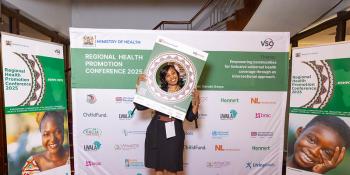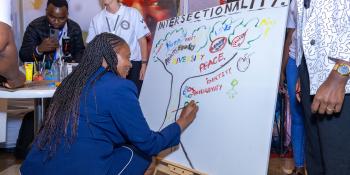Textile artist Sally Darlington was deeply inspired by the four years she spent volunteering with VSO in Ghana. She sadly lost her battle with terminal cancer earlier this month, but not before managing to put on one last retrospective of her work, and talking to VSO about a life taking the road less travelled. We remember her here, in her own words:
VSO volunteer Sally Darlington with students at Takoradi Polytechnic in Ghana in the late 1990s
When I left college, I wanted to do VSO right away. I thought I probably wasn’t ready at the time. Then after a few more years, once I’d been working and learned more about the textiles industry, I saw an advert in a magazine for VSO.
A dream fulfilled
Eventually, I got the call that would have a really big impact on my life. Would I like to go to Ghana?
I found myself in the fashion and textiles department of Takoradi Polytechnic College in 1995, tasked with improving the instruction students got, as well as encouraging them to start little businesses.
Most were women. Most couldn’t read and write. Their records would say they were around 16, but the more you looked into it, some were well into their 30s. Their parents had lacked money to send them to school, so this was their big opportunity.
They were working under a British syllabus, which I thought was a bit stupid. Here I am in Ghana, being asked to teach them things about Vivienne Westwood thinking, 'you don’t need to know that!'
So we all got together, the polytechnics, and re-wrote the syllabus so it was tailor-made for their Ghanaian lifestyles. It took us six months, but it got the green light and I understand that they are still working from that material now.
Learning from each other
I was expecting to bring my knowledge to help the students, but I was surprised to find out all they knew already.
You would walk around the campus where we all lived and see students creating these massive batiks in big vats. It was so hot anyway, but it was even hotter because of all this fabric boiling in the grounds – I will never forget it.
So volunteering was about me learning from them, them learning from me.
They were like sponges, they wanted to learn everything. I’d be in bed, it could be midnight, and one of my students would knock at the door wanting to ask a question about what they’d been studying.
African techniques
I was fortunate to do quite a lot of travelling. Each different part of Africa has a totally diverse range of fabrics and techniques, ways of weaving and so on, which was fascinating to me.
The best bit was how open and friendly people were about it. I didn’t mind going up to people and asking questions. I’d ask if I could have a go and they’d be excited to show me.
It’s influenced me to this day. In Cornwall I’ve been trying to do something similar to what they do in Ghana when you’re by the sea. You get metal objects and you cover it in sea salt, then lay it out on the dyed fabric as it dries. It goes all rusty and it’s a really nice effect. So I’m still using what I learned then, but trying to do new things with it.
Difficult news
That’s the sad part. I have cancer and I know I don’t have very much longer to live.
I was originally diagnosed last year. Then finally, on January 9th this year I got the all-clear. My partner Jane and I had always wanted to move to Cornwall, so we decided we didn’t want to wait any longer, kind of like a fresh start almost.
But then one day, I was sitting there and I thought, I don’t feel very well. I got a scan and there it was: the cancer was back, but this time it was in the liver and lymph nodes.
I said to the doctor, ‘Will I survive?’ He said ‘your time is really limited’.
Tying up loose threads
That’s when I thought of doing the exhibition. I knew it would be the last one I ever got to do. I just wanted to tie together everything I’ve seen and learned.
I wanted to show how my journey had gone, how it’s been shaped by my environment. From college, then Africa through VSO and learning all their techniques and colours, then working in Cheshire with silk worms, introducing influences from the wool industry in Lancashire. It was all about tying it all together in quite a satisfying way.
It was tiring. I probably shouldn’t have done it at all but it was just so important to me and I’m really proud I did. It felt like a big achievement.
Emotional moment
On the day of the opening, I had a little nap in the car before I had to go in to do a talk and Q&A about my work and life. Then it was time.
I walked into the gallery and it was absolutely heaving. I just couldn’t believe it. All my friends came from up north. I was really touched and overwhelmed that they had come all the way down. There were loads of people too who had just heard about my story. People really wanted to know about my VSO experience and what it was like to volunteer in Ghana.
Jane teased me, saying “I didn’t realise you were this popular!”
Life lessons
VSO has a huge influence in the way I work; the techniques I use came directly from what I was experiencing in Ghana. It’s broadened my perspective on my work and on life.
In Ghana I was struck by the generosity of people. People didn’t have it easy themselves, but my fridge was always full of food that people had cooked for me. I’ll never forget the people I met and the kindness I’ve experienced – I’m grateful for all of it.My advice to you is when you have the opportunity to work and learn like you do through VSO – do it. You might be afraid, but do it anyway.
Sally Darlington passed away on 11 November 2017, two weeks after granting this interview. Her equipment, materials and a collection at her memorial service have been donated to Northlight Art, her former studios in Hebden Bridge, in order to continue the textile education programme she started there.
Latest posts

The two volunteers empowering girls and young women in Mozambique
Nelma and Carmirene and are two volunteers working on VSO's EAGLE project in Mozambique. For Nelma and Carmirene, education is not just about school, it is about meeting people where they are and using the right tools to challenging harmful norms. Here are their stories.

In photos: Our Regional Health Promotion Conference 2025
Check out some of our favourite photos from Regional Health Promotion Conference (RHPC25). This event sought to reimagine Universal Health Coverage through the lens of intersectionality.

Using intersectionality to create healthy beginnings and hopeful futures
World Health Day brings global attention to the urgent need to end preventable maternal and newborn deaths. Learn more about how our Regional Health Promotion Conference is tackling these issues head on.
